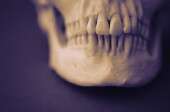High rate of concussion linked to isolated mandible fractures

(HealthDay)—The rate of concussions associated with isolated mandible fractures is high, according to a study published online Oct. 8 in JAMA Facial Plastic Surgery.
In a prospective study, Lindsay Sobin, M.D., from the State University of New York Upstate Medical Center in Syracuse, and colleagues examined the rate of mild traumatic brain injury in patients with isolated mandible fractures. Patients were evaluated in the emergency department of a level I trauma center during one year, and were administered the Military Acute Concussion Evaluation (MACE).
The researchers found that 16 patients met the study eligibility criteria (14 male; mean age, 27.5 years). The mechanism of injury was assault, sports, all-terrain crash, and biking in 12 (75 percent), two (13 percent), one (6 percent), and one patients (6 percent), respectively. Fifty percent of the patients admitted to alcohol use; none reported illicit drug use. Sixty-nine percent of patients reported loss of consciousness. Seventy-five percent of patients met the MACE criteria for concussion; of these, 58 percent reported alcohol use at the time of injury. No correlation was seen between concussion rates and alcohol use.
"Mandible fractures are often sustained after high-force impacts during altercations between men," the authors write. "Patients with isolated mandible fractures may benefit from being screened for concussion and referred to a concussion clinic."
More information:
Abstract
Full Text
Editorial (subscription or payment may be required)
Copyright © 2015 HealthDay. All rights reserved.

















